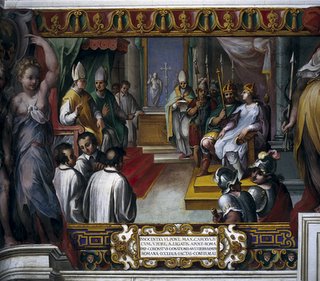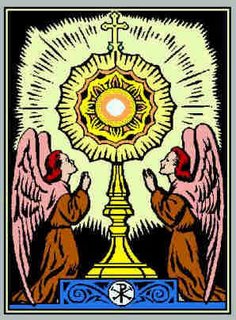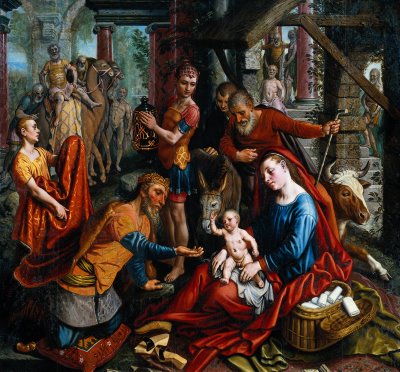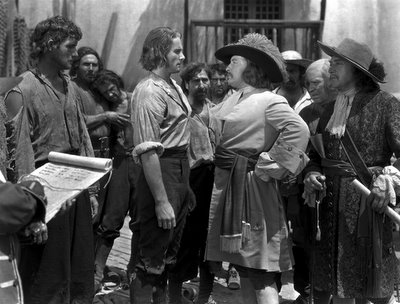Recordabar psalmorum meorum in nocte cum corde meo loquebar et scobebam spiritum meum...
Thursday, January 19, 2006
Crazy going slowly
This is a nice idea, of course, but I wish she'd decided to do all this longer ago. Auditions are tonight. Grr. I also wish I had time to get more things done, like blog. I'm running all the time now. College is nuts. Sheesh.
Bye.
Wednesday, January 18, 2006
Smell the color nine...
On a lighter note, I've decided that living in a dorm with a bunch of girls is a lot of fun. We stayed up until almost 10 having a "hall meeting," which mainly consisted of making or drinking cappucino and all talking loudly at the same time. It was good. Of course, so was the prank call to our good buddy Joe, but that's a dufferent kind of good. It was rather a "is he laughing really hard, or did that sound more like a coronary?"
My theology professor greeted me before class with, "Ah, Miss P, you're the audiophile, are you not? Because I seem to have two copies of Bach's Christmas Oratorio in my colllection, and I have the extra in my car to give to you."
I love school. It adds so much to college life! The classes, the schedules. They're all so wonderful.
Figures...
A door will snap shut only when you have left the keys inside. (Yale Law of Destiny)
When one's hands are covered with oil, grease, or glue, your nose will start to itch. (Law of Ichiban)
Your insurance will cover everything but what has happened. (Insurance So Sorry Law)
When things seem to be going well, you've probably forgotten to do something. (Cheney's Second Corollary)
When things seem easy to do, it's because you haven't followed all the instructions. (Destiny Awaits Law)
If you keep your cool when everyone else is losing his, it's probably because you have not realized the seriousness ofthe problem. (Law of Gravitas)
Most problems are not created or solved; they only change appearances. (Einstein's Law of Persistence)
You will run to answer the telephone just as the party hangs up on you. (Principle of Dingaling)
Whenever you connect with the Internet, the call you've been waiting for all day will arrive. (Principle of Bellsouth)
If there are only two programs on TV that are worth your time, they will always be at the same time. (Law ofWasteland)
The cost is always higher than one budgets for, and it isexactly 3.14 times higher, hence the importance of pi. (Lawof Pi Eyed)
The probability that one will spill food on one's clothes is directly proportional to the need to be clean. (Law ofCampbell Scoop)
Each and every body submerged in a bathtub will cause the phone to ring. (Law of Yes Now)
Each and every body sitting on a commode will cause the doorbell to ring. (Law of Ding Dong)
Wind velocity will increase proportionally to the cost of one's hairdo. (The Don King Principle)
After discarding something not used for years, you will need it one week later. (Law of Fatal Irreversibility)
Arriving early for an appointment will cause the receptionist to be absent, and if one arrives late, everyoneelse has arrived before you. (Law of Delay)
Do not take life too seriously, because in the end, you won't come out alive anyway. (Theory of Absolute Certainty)
Wednesday, January 11, 2006
Keephousing
St. Joseph might come back.
He might not. I might pick a new saint to shepherd the links. Maybe the patron of golfers or something. I'm still deciding. For now, however, I've put a couple new blogs on the sidebar, a couple new real websites, and just generally cleaned house. If something doesn't work, email me your irate and screaming complaint, and I'll see to it within the next fiscal year. You know, the one that starts in September?
(-: Cheers. Don't look for much blogging from me after this. School starts Monday.
Catholicism is so cool!
 VATICAN CITY, JAN. 10, 2006 (Zenit.org).- The Vatican Secret Archives may now be visited on the Internet. After selecting the language on the Holy See's site, a click on the Focus section of the home page offers a virtual walk through the archives' age-old halls amid frescoes and documents.
VATICAN CITY, JAN. 10, 2006 (Zenit.org).- The Vatican Secret Archives may now be visited on the Internet. After selecting the language on the Holy See's site, a click on the Focus section of the home page offers a virtual walk through the archives' age-old halls amid frescoes and documents.One may (virtually) page through documents such as the 14th-century Parchment of Chinon, which records the absolution of Pope Clement V of the leading members of the Templar Order. Also accessible are the proceedings of the trial against Galileo Galilei.
Among other treasures, the Vatican Secret Archives include key documents concerning the history of single nations. "Moreover, for some countries, the Vatican documents are the oldest ones, which even mark the beginning of their own national history," explains the Web page.
The archives include about 85 linear kilometers (52 miles) of shelves. The oldest document dates to the eighth century, while the archives have an almost uninterrupted documentation starting from 1198.
The archives are primarily used by the Pope and the Roman Curia. In 1881, by decision of Pope Leo XIII, part of the archives was opened to be consulted by scholars, "thus becoming the most important center of historical research in the world."
Can she bake a cherry pie?
I want to watch Star Wars again.
Monday, January 09, 2006
In honour of Danica...
In honour of Joseph...
In honour of Zach...
Lèctio sancti Evangèlii secundum Marcum...
 'And he preached, saying, "After me comes he who is mightier than I, the thong of whose sandals I am not worthy to stoop down and untie. I have baptized you with water; but he will baptize you with the Holy Spirit." In those days Jesus came from Nazareth of Galilee and was baptized by John in the Jordan. And when he came up out of the water, immediately he saw the heavens opened and the Spirit descending upon him like a dove; and a voice came from heaven, "Thou art my beloved Son; with thee I am well pleased." '
'And he preached, saying, "After me comes he who is mightier than I, the thong of whose sandals I am not worthy to stoop down and untie. I have baptized you with water; but he will baptize you with the Holy Spirit." In those days Jesus came from Nazareth of Galilee and was baptized by John in the Jordan. And when he came up out of the water, immediately he saw the heavens opened and the Spirit descending upon him like a dove; and a voice came from heaven, "Thou art my beloved Son; with thee I am well pleased." '
Sunday, January 08, 2006
Pope Denounces Culture of Death
 VATICAN CITY, JAN. 8, 2006 (Zenit.org).- Benedict XVI administered the sacrament of baptism for the first time in his pontificate to 10 newborns, and urged a "no" to the "prevailing" culture of death.
VATICAN CITY, JAN. 8, 2006 (Zenit.org).- Benedict XVI administered the sacrament of baptism for the first time in his pontificate to 10 newborns, and urged a "no" to the "prevailing" culture of death.Today, on the day the Church celebrates the Baptism of Jesus, the Pope resumed Pope John Paul II's practice of baptizing infants on the liturgical feast that closes out the Christmas season. John Paul II had been unable to carry out the baptisms the last two years because of his declining health.
The sacrament was administered before Michelangelo's "Last Judgment" in the Sistine Chapel, the same place where Cardinal Joseph Ratzinger was elected Bishop of Rome on April 19. The Holy Father addressed a spontaneous homily to the parents, godparents and families of the 10 Italian newborns, five boys and five girls. One of them received the second name Karol, in Polish, in memory of the late Pope.
"With baptism, this child is introduced in the company of friends who will never abandon him in life and in death, and this company of friends is the family of God, which bears in itself the promise of eternity," said the Pope.
Benedict XVI noted: "None of us know what will happen on our planet, in our Europe, in the next 50, 60 or 70 years, but there is something of which we are certain: that the family of God will always be present and that those who belong to this family are never alone, but have the sure friendship of him who is life."
Because of this, coherence with baptism calls for saying "yes" to Christ and to life, and "no" to evil and death, the Pope said. "We can say that also in our time a 'no' is necessary to the prevailing culture of death, an anti-culture that manifests itself, for example, in the escape in drugs," he said.
"Escape from reality in the illusory, in a false happiness that manifests itself in lies, in fraud, in injustice, in contempt for others, for solidarity, for responsibility vis-à-vis the poor and the suffering," he stated.
The culture of death, the Holy Father continued, "manifests itself in a sexuality that becomes pure gratification without responsibility, that makes of man a thing, so to speak, as it no longer considers him as person, with a personal love, with fidelity, but turns him into merchandise."
"To this apparent promise of fidelity, to this pomp of an apparent life which in reality is no more than an instrument of death, to this 'anti-culture,' we say 'no' to cultivate a culture of life," he continued. Benedict XVI added that the "yes" of the culture of life is pronounced with fidelity to the Ten Commandments, "which are not prohibitions, but a vision of life."
He explained: "They are a 'yes' to a God who gives meaning, in the first Commandments; 'yes' to the family, Fourth Commandment; 'yes' to life, Fifth Commandment; 'yes' to responsible love, Sixth Commandment; 'yes' to solidarity, social responsibility and justice, Seventh Commandment; 'yes' to truth. This is the philosophy and culture of life that becomes concrete, possible and beautiful in communion with Christ."
Therefore, "baptism is a gift of life and a challenge to live life," saying "no" to the "attack of death, which presents itself in the disguise of life," the Pope said. In the prayer of the faithful during the Mass, amid the cries of newborns, prayers were raised for families, that the "prodigy of love" be renewed in them daily, and for the 10 newly baptized infants, that they be "witnesses of the Gospel."
Dixit domine...
Christmas break is winding down for me. Next weekend, I'll be back at school, frantically searching for all the rest of my books, making sure I know what classes I'm even registered for, and getting used to all those school people again. (Schnykies...the 'o' button on my computer is really dying now. It hardly works at all.) I'll also be moving furniture again, if all goes well. So far, my roommate (or roommates) and I haven't managed to return from a single break without in some way, shape, or form, rearranging the woodstuffs in our room. I don't just mean the little bookcases or something like that, either. I'm talking about the big Correlian ships; beds, dressers, desks, etc.
Anyway, this week I get to visit the dentist and buy a new notebook and things like that. Little items of housekeeping before the long hard road to May is embarked upon. My sister, I think, will in some small way be glad I'm gone. Maybe then I'll stop borrowing her clothes. All her socks have holes in them, by the way, and I didn't put them there. My brother will be glad, in some small way, because it means the keyboard will be at home once more and he can get back to writing music. I don't know about my parents. I haven't asked yet. (-:
Saturday, January 07, 2006
Prayer of St. Ambrose

courtesy of Women for Faith and Family...
Oh, crumbs.
John was right.
Ugh.
He said to me once that writing was something you disciplined yourself to do--each day you have to make up your mind to just sit down and write something, anything, but to do it whether you felt like it or not. He was right. As long as I had a deadline for posting those twelve days of Christmas, I was on the ball. I was there. I was ready. I was willing.
Now, there's no pressure. And there's also no post. I don't have someone standing over me, asking about the next day, so I'm just resting on my proverbial laurels (I'll be darned if I've figured out where they are, though) and doing nothing. John was right. Ugh.
Friday, January 06, 2006
Adoremus!
 Middle panel of a triptych The Adoration of the Magi; c. 1560; Oil (?) on panel, 167.5 x 179 cm; Rijksmuseum, Amsterdam
Middle panel of a triptych The Adoration of the Magi; c. 1560; Oil (?) on panel, 167.5 x 179 cm; Rijksmuseum, AmsterdamThe baby Jesus is sitting on the lap of his mother, the Virgin Mary. He is holding his hand up in a blessing. Before him kneels a king offering a gift of gold. This is Melchior, the oldest of the three kings who came to pay homage to the infant Christ. Behind Mary, in a red gown is her husband Joseph. According to tradition, Jesus was born in a stable. The donkey, the ox and the shabby straw roof remind us of this. The scene takes place against the background of a ruined palace with marble columns and steps. This refers to King David, a distant ancestor of Jesus. The ruin is symbolic and represents the old world: Jesus represents the new, Christian world.
Pieter Aertsen painted this large, colourful panel in around 1560. It is a varied scene with many attractive details such as the rather homely basket of clothes beside Mary and the king's entourage with camels on the left of the background.
The Fest of the Adoration of the Magi
Read much more on the Magi at Newadvent, or more on the Epiphany Feast. Feliz fiesta!
Thursday, January 05, 2006
On the twelfth day of Christmas...
Twelve Drummers Drumming

The twelve points of doctrine in the Apostle's Creed: 1) I believe in God, the Father almighty, creator of heaven and earth. 2) I believe in Jesus Christ, his only Son, our Lord. 3) He was conceived by the power of the Holy Spirit and born of the virgin Mary. 4) He suffered under Pontius Pilate, was crucified, died, and was buried. He descended into hell. 5) On the third day he rose again. He ascended into heaven, and is seated at the right hand of the Father. 6) He will come again to judge the living and the dead. 7) I believe in the Holy Spirit, 8) the holy Catholic Church, 9) the communion of saints, 10) the forgiveness of sins, 11) the resurrection of the body, 12) and life everlasting.
Wednesday, January 04, 2006
Religion and Patriotism
We know our obligations to our country. Gladly do we fulfill them and render our full contribution to the upholding and upbuilding of democracy. As loyal, patriotic, American citizens we have apprehensions of dangers to democracy, dangers from our avowed enemies beyond the confines of our land, and dangers from those within our borders whose concept of democracy is an arsenal of privileges for themselves.
This is a situation which evokes an important consideration. Before this present world war, and for some time preceding it, there were approximately 30,000 fewer French inhabitants in France each succeeding year. During the past decade in the United States the number of persons over sixty years of age has increased almost one-third, which is a great tribute to our doctors, to our scientists and our government. But what is vitally ominous is the fact that the number of children under fifteen years of age decreased and the trend is such that within the next generation there will be more people in this country over sixty years of age than there will be children under fifteen years.
This reflection and others of like import are pressingly ominous challenges to the domestic life of our nation. And they are challenges to our national life, for we cannot win the war for America if we lose the battle for the cradle!
~Francis Cardinal Spellman
The Road to Victory (1942)
On the eleventh day of Christmas...
Eleven Pipers Piping

Tuesday, January 03, 2006
On the tenth day of Christmas...
Ten Lords A-leaping
 The ten commandments: 1) You shall have no other gods before me; 2) Do not take God's name in vain; 3) Remember the Sabbath Day; 4) Honor your father and mother; 5) Do not murder; 6) Do not commit adultery; 7) Do not steal; 8) Do not bear false witness; 9) Do not covet a man's wife; 10) Do not covet a man's goods. (Exodus 20:1-17)
The ten commandments: 1) You shall have no other gods before me; 2) Do not take God's name in vain; 3) Remember the Sabbath Day; 4) Honor your father and mother; 5) Do not murder; 6) Do not commit adultery; 7) Do not steal; 8) Do not bear false witness; 9) Do not covet a man's wife; 10) Do not covet a man's goods. (Exodus 20:1-17)
Monday, January 02, 2006
On the ninth day of Christmas...
Nine Ladies Dancing

The nine Fruit of the Holy Spirit: 1) love, 2) joy, 3) peace, 4) patience, 5) kindness,6) generosity, 7) faithfulness, 8) gentleness, and 9) self-control. (Galatians 5:22)
Sunday, January 01, 2006
Charles Carroll made history as the lone Catholic signer of the Declaration of Independence, but his legacy is all but ignored in today's classrooms.
NASHVILLE, Tennessee, 1 NOV. 2005 (ZENIT)
Scott McDermott, a circulation librarian at Vanderbilt University Divinity School, writer and convert, began studying about Carroll after he came into the Church and wrote about his findings in "Charles Carroll of Carrollton: Faithful Revolutionary" (Scepter).
McDermott shared with ZENIT how Carroll influenced America, and how its Founding Fathers may have unknowingly reinvented the Catholic political tradition.
Part 2 of this interview will appear Wednesday.
Q: Why did you choose to do a biography on Charles Carroll?
McDermott: When I was an undergraduate, prior to my conversion to Catholicism, I studied the American Revolution quite a bit.
The conflict was described almost exclusively in terms of what has been called the "Whig view of history." In this view, all history is seen in terms of linear progress toward maximum personal freedom, of the sort enjoyed by Protestant Englishmen in the 19th century.
Now this is a rather antiquated point of view, which was denounced by such influential 20th-century historians as Sir Herbert Butterfield and Sir Karl Popper.
It was, however, alive and well in history departments in the 1980s, albeit in a different form: Instead of progress toward Anglo-American political institutions, history was interpreted as a gradual struggle for liberation of all
peoples from oppressive "Western" truths and customs.
So, we were given the Whig school in postmodern dress, and the American Revolution was seen not as an affirmation of timeless laws of nature, but merely as an assertion of civil rights.
After my conversion, I became interested in knowing whether the Revolution could in fact be related to the older Christian — and Catholic — political tradition. Charles Carroll of Carrollton, as the only Catholic signer of the Declaration of Independence, was the obvious place to start.
Educated by Jesuits in France, Carroll was steeped in the Catholic political tradition: from St. Thomas, through St. Robert Bellarmine and Francisco Suárez, all the way down to Montesquieu.
His thought clearly reflects Catholic political precepts such as the priority of the common good, corporatism, the liberty of the Church, popular sovereignty, the natural law, and what later came to be called subsidiarity.
But Carroll had to be careful about quoting any of the great Catholic doctors of the Church, because of the taboo against Catholicism in English political life. Carroll brought these ideas into the mix at the time of the Founding, without acknowledging their source.
I've been accused of saying that the American Revolution originated directly from Catholic political teaching. This is obviously not the case; the truth is more complex and interesting.
Catholic teaching was almost totally suppressed in the British Empire in the 18th century. The colonists thought they hated the Catholic political tradition, which they mistakenly identified with the Stuarts' doctrine of divine right. But the Founding Fathers really had no idea what the authentic tradition was.
When they began to resist the king in Parliament, they had to develop a new political science fast.
There was a radical political tradition in England coming from the Puritans, which included the idea of resistance to tyranny; but the Puritan tradition emphasized the supremacy of Parliament, the same Parliament that passed the Stamp Act, and the Townshend Acts and the Intolerable Acts. So the Americans had to dig deeper.
There was the common law, under which laws that violated the natural rights of Englishmen were theoretically null and void. But in spite of the lip service paid by Coke and Blackstone to this theory, the truth was that no judge in England was willing to throw out acts of Parliament, especially those relating to American colonists, on grounds of natural law.
So the colonists had to go back beyond common law, to its roots in the natural law, as proclaimed by Bracton and St. Germain and the courts of equity prior to the Reformation.
I argue that the Founding Fathers unknowingly reinvented the Catholic political tradition. If anyone had suggested to them at the time that that is what they were doing, the Founders would have been horrified. Paradoxically, they were able to revive several elements of Catholic thinking because they were totally ignorant of the authentic tradition.
They also had Charles Carroll in Congress and in the Maryland Senate, pushing them toward Catholic political practice without ever letting on what he was doing. And this is what the Third Plenary Council of Baltimore meant when it said in 1884 that the framers of the Constitution were "'building better than they knew,' the Almighty's hand guiding them."
The results were not perfect, but approximated Catholic political thought in a number of important ways.
Q: How did Carroll use natural law and natural rights in arguing that the colonies were justified in breaking from England?
McDermott: In his "First Citizen" papers of 1773, Carroll argued that it was necessary to move back beyond the common law to the "clear and fundamental" principles of the English constitution, namely the natural law.
Thomas Jefferson's Declaration of Independence cites the "Laws of Nature and of Nature's God" to justify the Revolution, and appeals to the natural rights that derive from the natural law.
At the same time, Carroll was writing his own "Declaration of the Delegates of Maryland" to explain Maryland's vote for independence. Carroll's natural law thinking as expressed in this document complements Jefferson's approach while correcting some of its distortions.
Carroll wrote: "We the Delegates of the People of Maryland in Convention assembled do declare that the King of Great Britain has violated his compact with this People, and that they owe no allegiance to him."
Then he went back and crossed out "of the People." Thus, in keeping with Catholic corporatism, the "Delegates of Maryland" represent the whole body of society, and not just the majority will. Popular sovereignty is not a matter of ongoing revision of the Constitution by majorities, as Jefferson supposed.
Also, Carroll's document stays with the traditional natural rights of life, liberty and property. "Slaves, savages and foreign mercenaries have been meanly hired to rob a People of their property, liberty [and] lives, guilty of no other crime than deeming the last of no estimation without the secure enjoyment of the two former."
Jefferson, of course, substitutes a right to the "pursuit of happiness" for the right to property. By inventing this new right, Jefferson distorted the concept of natural law, with dramatic consequences for the rest of American history.
Maryland's Declaration appeals for its truth "to that Almighty Being, who is emphatically styled the Searcher of hearts, & from whose Omniscience nothing is concealed."
Jefferson's original draft described the natural law as a "sacred and undeniable" truth. Franklin insisted on suppressing even this vague reference to the divine, and so we have the phrase "we hold these truths to be self-evident."
Well, they are self-evident, but they also come from a personal Divine Lawgiver without whom natural law has no meaning.
On the eighth day of Christmas...
Eight Maids A-milking

The eight Beatitudes: 1) Blessed are the poor in spirit, 2) those who mourn, 3) the meek, 4) those who hunger and thirst for righteousness, 5) the merciful, 6) the pure in heart, 7) the peacemakers, 8) those who are persecuted for righteousness' sake. (Matthew 5:3-10)


